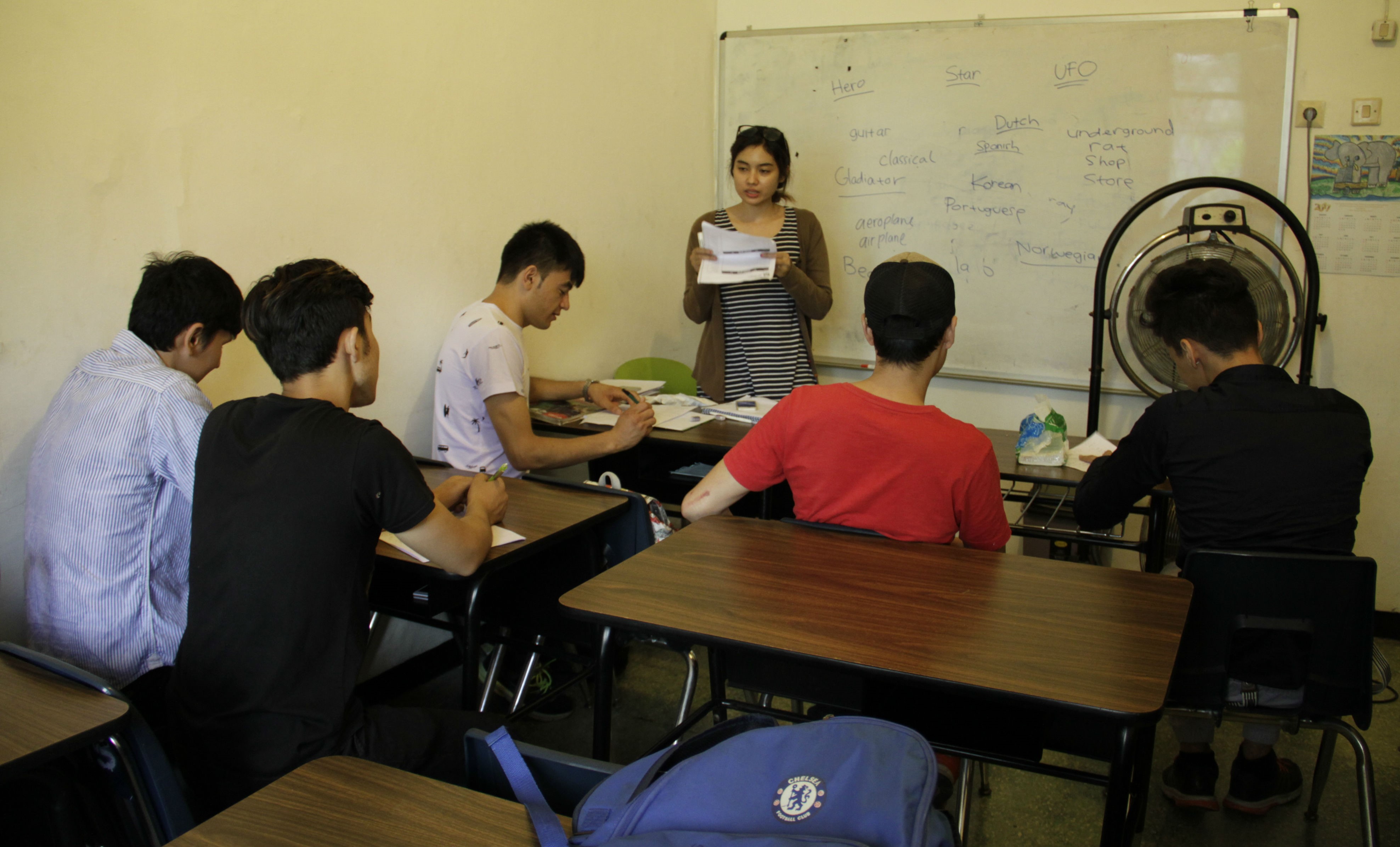The sun shines brightly over an inconspicuous building nestled in a tiny residential street in South Jakarta. Inside, some refugee children learn teamwork and conflict management, while others practice new English phrases. Still others giggle while attempting to pronounce English words. This is Roshan Learning Center, a bustling refugee oasis in a traditional Jakartan neighborhood.

Some refugee youth learn English at Roshan Learning Center, a community-run center serving refugees living in Greater Jakarta.
JAKARTA, INDONESIA – These learning activities are part of several programs offered by Roshan, a community-run center serving refugees living in Greater Jakarta. Roshan provides educational courses for refugee children, teens, and adults in English, Bahasa Indonesia, and Farsi, taught by refugees, as well as Indonesian and expatriate volunteers. The center also helps refugees through a number of services, including counseling, health clinics, and free use of center computers.
As the center has grown, so has its recognition. Founded in 2014 by expatriates Heather Tomlinson and Ashley Berryhill, Roshan is well-known among segments of the refugee community in Jakarta. Each semester brings a long waiting list of refugees seeking enrollment in its programs. In an interview with UNHCR, Tomlinson noted that the center faces a teacher shortage and lack of facilities, in part due to the high demand for classes within the refugee community. The learning center management team is forced to use a selection process for applicants. Roshan accepts new students twice a year in January and July, and as of June 2017, 96 students were enrolled in the learning center. Tomlinson hopes that the number of students will increase to around 125 persons for the upcoming semester.
Through its motto, “Opening doors to brighten futures for refugees,” Roshan promotes five values, which facilitators call “DOORS” – Doing good for others, Opening our minds, Owning responsibility, Reaching for the stars and Supporting our friends. In line with the organization’s motto, Roshan students are encouraged to give back to the local Indonesian community to foster better relationships between Indonesians and refugees. For instance, a group of students recently volunteered with the American Women’s Association (AWA) to deliver hygienic supplies and small gifts to local Indonesian children in Fatmawati Hospital.
Thanks to Roshan, many refugees in Jakarta are able to see a brighter future ahead. For a long time, Jamal (not his real name, 26, dreamed of being a teacher. While studying mathematics in university in Afghanistan, he worked as a part-time teacher in his community in between his classes. When violence in Afghanistan forced Jamal to flee to Indonesia in 2014, he felt that his dreams of being an educator were gone. Then another refugee friend introduced him to Roshan.
“I [told the staff] that I wanted to study English. Then they asked me to teach science and math,” said Jamal, who began teaching at Roshan in 2015. “I like helping other refugees,” he added.
Jamal said that teaching at Roshan was challenging because students often were not at the same academic level. “Some students have [attended school] previously, [while] some have never [been to school].” In the future, Jamal hopes to pursue a graduate degree in mathematics, focusing on algebra, and then to teach at the university level.
Roshan has brought hope to dozens of refugee youth like Jamal across Jakarta. “When I came to Indonesia, I couldn’t speak English, but now [through Roshan’s classes] I can speak the language. Our teachers are nice and helpful,” said Ali, a 20-year-old refugee from Afghanistan who had completed high school in Afghanistan and wants to be a nurse.
“I [want] to go to school here, but I can’t because [attending school] is difficult for refugees. But I try to learn things while I’m here,” he continued. “I learn about nursing a bit here and there, and [eventually] I want to study nursing at university,” he beamed.
Another student, Rania, 19, was ecstatic after discovering Roshan via Facebook when she arrived in Jakarta six months ago. “I went to high school in Afghanistan. I want to be a singer, because I like singing, but I also want to study in university as well,” she explained. Rania is a rapper and wishes to continue pursuing her love of music in Indonesia while also pursuing academic classes to prepare her for university.
Although demand for classes is high, Roshan facilitators hope to improve gender balance in the courses. “We prioritize [for instance] girls for secondary class [high school-level courses] to get gender balance,” Tomlinson explained, adding that only a few girls and women are currently enrolled at Roshan.
Though refugees have overwhelmingly supported Roshan, some instances of cultural pushback from the communities, many of whom come from conservative societies with restrictive gender roles, have contributed to unequal gender enrollment in programs.
Several girls dropped out of the programs, and others claimed that refugee parents don’t want their daughters to become too educated. “We have theories, but there’s no concrete information,” Tomlinson added. The management team continues to encourage refugee girls to enroll in its programs.
Eventually, Tomlinson hopes to enable Roshan students to enroll in Indonesian public schools. “I think it would be great to get [refugees into] public schools. If they go to public schools, it means that they can attend school five days a week, so they’ll have more opportunity to make friends, enjoy [their] time in Indonesia, and be more prepared,” she said
Once this happens, the next step is to prepare parents and their children for the transition. “I think Roshan has an opportunity to be a bridge school between no-school-at-all and public school,” Tomlinson stressed. In the meantime, Roshan will continue to provide quality classes for refugees, ensuring that rights to education are upheld despite displacement.
Note: The names of refugees in this story have been changed to preserve anonymity.
Share on Facebook Share on Twitter